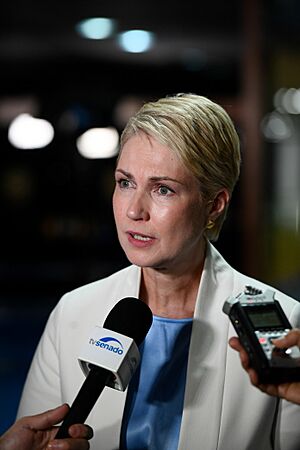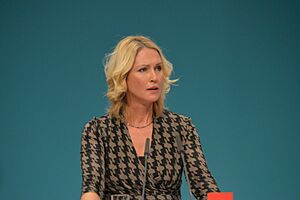Manuela Schwesig facts for kids
Quick facts for kids
Manuela Schwesig
MdL MdBR
|
|||||||||||||||||||||||||
|---|---|---|---|---|---|---|---|---|---|---|---|---|---|---|---|---|---|---|---|---|---|---|---|---|---|

Schwesig in 2024
|
|||||||||||||||||||||||||
| President of the Bundesrat | |||||||||||||||||||||||||
| In office 1 November 2023 – 31 October 2024 |
|||||||||||||||||||||||||
| First Vice President | Peter Tschentscher | ||||||||||||||||||||||||
| Preceded by | Peter Tschentscher | ||||||||||||||||||||||||
| Succeeded by | Anke Rehlinger | ||||||||||||||||||||||||
| Minister-President of Mecklenburg-Vorpommern |
|||||||||||||||||||||||||
| Assumed office 4 July 2017 |
|||||||||||||||||||||||||
| Deputy | Lorenz Caffier Harry Glawe Simone Oldenburg |
||||||||||||||||||||||||
| Preceded by | Erwin Sellering | ||||||||||||||||||||||||
| Leader of the Social Democratic Party of Mecklenburg-Vorpommern |
|||||||||||||||||||||||||
| Assumed office 2 June 2017 |
|||||||||||||||||||||||||
| Deputy | Stefan Sternberg Nadine Julitz Christian Pegel Erik von Malottki Reem Alabali-Radovan |
||||||||||||||||||||||||
| General Secretary | Julian Barlen | ||||||||||||||||||||||||
| Preceded by | Erwin Sellering | ||||||||||||||||||||||||
| Leader of the Social Democratic Party |
|||||||||||||||||||||||||
|
Acting
|
|||||||||||||||||||||||||
| In office 3 June 2019 – 10 September 2019 Serving with Malu Dreyer, Thorsten Schäfer-Gümbel
|
|||||||||||||||||||||||||
| General Secretary | Lars Klingbeil | ||||||||||||||||||||||||
| Preceded by | Andrea Nahles | ||||||||||||||||||||||||
| Succeeded by | Norbert Walter-Borjans Saskia Esken |
||||||||||||||||||||||||
| Deputy Leader of the Social Democratic Party |
|||||||||||||||||||||||||
| In office 13 November 2009 – 10 September 2019 |
|||||||||||||||||||||||||
| Leader | Sigmar Gabriel Martin Schulz Andrea Nahles |
||||||||||||||||||||||||
| Preceded by | Peer Steinbrück | ||||||||||||||||||||||||
| Succeeded by | Klara Geywitz | ||||||||||||||||||||||||
| Minister of Family Affairs, Senior Citizens, Women and Youth | |||||||||||||||||||||||||
| In office 17 December 2013 – 2 June 2017 |
|||||||||||||||||||||||||
| Chancellor | Angela Merkel | ||||||||||||||||||||||||
| Preceded by | Kristina Schröder | ||||||||||||||||||||||||
| Succeeded by | Katarina Barley | ||||||||||||||||||||||||
|
|||||||||||||||||||||||||
|
|||||||||||||||||||||||||
| Personal details | |||||||||||||||||||||||||
| Born |
Manuela Frenzel
23 May 1974 Frankfurt (Oder), Bezirk Frankfurt (Oder), East Germany (now Brandenburg, Germany) |
||||||||||||||||||||||||
| Political party | Social Democratic Party (2003–) | ||||||||||||||||||||||||
| Spouse |
Stefan Schwesig
(m. 2000) |
||||||||||||||||||||||||
| Children | 2 | ||||||||||||||||||||||||
| Residence | Schwerin | ||||||||||||||||||||||||
| Alma mater | Fachhochschule für Finanzen Brandenburg | ||||||||||||||||||||||||
| Occupation |
|
||||||||||||||||||||||||
Manuela Schwesig (born Manuela Frenzel on May 23, 1974) is a German politician from the Social Democratic Party (SPD). Since July 4, 2017, she has been the Minister-President of the German state of Mecklenburg-Vorpommern. This role is similar to being the governor of a state in the U.S. She was the first woman to hold this position in her state.
Before leading her state, Schwesig was a national leader. She served as the Federal Minister of Family Affairs, Senior Citizens, Women and Youth from 2013 to 2017 in the government of Chancellor Angela Merkel. She also served as President of the Bundesrat, a council that represents Germany's states, from 2023 to 2024.
Contents
Early Life and Schooling
Manuela Schwesig was born in Frankfurt (Oder), which was then part of East Germany. She grew up in the nearby town of Seelow. When she was a teenager in 1990, she had a small acting part in a German movie called Verbotene Liebe (Forbidden Love).
After finishing high school in 1992, she went to a special college in Königs Wusterhausen. There, she studied tax administration, which is about how the government collects taxes.
Political Journey
Schwesig joined the Social Democratic Party (SPD) in 2003 when she was 29 years old. Her political career started in her local community.
Starting in Local Politics
From 2004 to 2008, Schwesig was a member of the City Council in Schwerin. This experience helped her understand the needs of people in her city.
Moving to State and National Politics
In 2008, Schwesig became the Minister of Social Affairs and Health in her home state of Mecklenburg-Vorpommern. In 2009, she became a deputy leader of the national SPD party.
During the 2009 national election campaign, she was part of a "shadow cabinet." This is a team of experts a party leader chooses to show who would be in charge if they won. Schwesig's role was to focus on policies for families.
Federal Minister for Families
After the 2013 national election, Schwesig became the Federal Minister of Family Affairs, Senior Citizens, Women and Youth. At 39, she was the youngest member of Chancellor Angela Merkel's government team.
As minister, she worked on important issues. She helped create a law that required large companies to have more women on their leadership boards. She also worked to expand government-funded childcare to help working parents.
Leader of Mecklenburg-Vorpommern
In 2017, Schwesig decided to leave her national role to run for Minister-President of Mecklenburg-Vorpommern. She won and took office on July 4, 2017.
As the state's leader, she became very popular. In the 2021 state election, her party won by a large margin. Her campaign slogan was "Die Frau für MV," which means "The woman for Mecklenburg-Vorpommern." After the election, her party formed a new government partnership with The Left party.
What She Believes In
Manuela Schwesig has focused on several key areas during her career.
Helping Children and Families
Schwesig is a strong supporter of fighting child poverty. She believes all children should have a good start in life. She has worked to make sure there are good, affordable childcare centers for families.
Supporting Women's Equality
Schwesig has worked to make things fairer for women. In 2015, she helped pass a law requiring big companies to include women in top leadership roles. She also wanted a law that would let women see if they were being paid less than men for the same job.
Standing Against Extremism
In 2014, Schwesig spoke out against the far-right political party NPD. She said that the main goal was to keep this party out of the state government. The NPD took her to court, saying her comments were unfair. However, Germany's highest court decided that her comments were a normal part of political debate.
Personal Life
Manuela Schwesig is married to Stefan Schwesig and they have two children.
In 2019, she shared that she had been diagnosed with breast cancer. She stepped back from her national party roles to focus on her health. She later announced in May 2020 that her treatment was successful and she had recovered from the illness.
Other Activities
Besides her main political jobs, Schwesig is involved in many organizations.
- She is a member of the German Child Protection League.
- She is on the board of trustees for the Deutsches Museum.
- She is a member of Plan International Deutschland, an organization that helps children.
- She is a member of a group called Gegen Vergessen – Für Demokratie (Against Forgetting – For Democracy).
See also
 In Spanish: Manuela Schwesig para niños
In Spanish: Manuela Schwesig para niños
 | Calvin Brent |
 | Walter T. Bailey |
 | Martha Cassell Thompson |
 | Alberta Jeannette Cassell |


